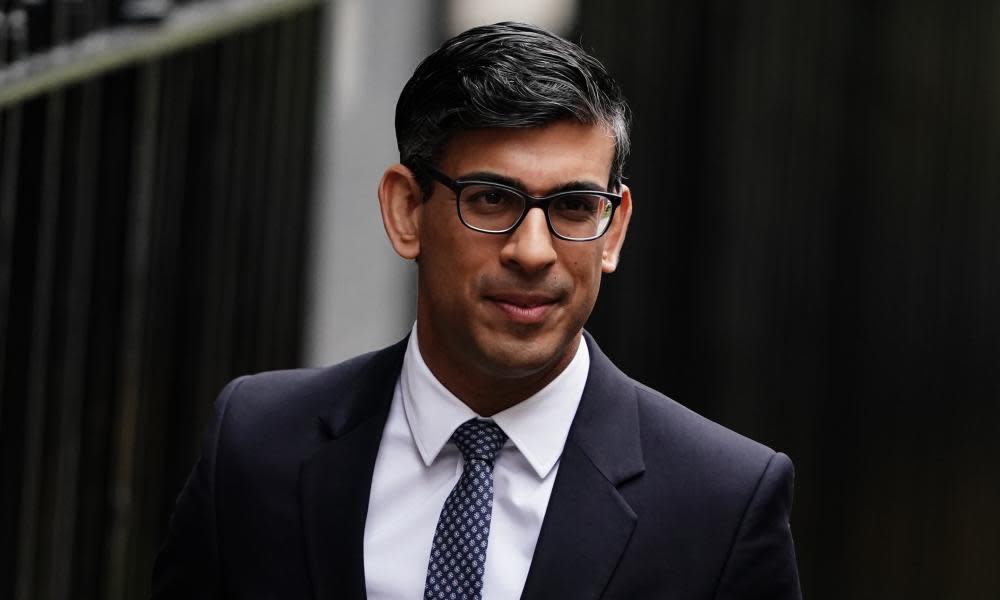Behind the smile, smart suits and ‘reasonable’ solutions lies Rishi Sunak the authoritarian

In some ways, this has been a good year so far for Rishi Sunak. His young government has produced a succession of solutions to problems that have dogged the Tories for years, from the Channel boats to the Irish border. These solutions may well not work; but until that is clearly the case, the impression of a problem-solving prime minister has been created, in studied contrast to the chaos left by his two predecessors.
After this week’s privileges committee hearing and their Commons defeat over the Irish border, Boris Johnson and Liz Truss seem even more discredited. Meanwhile, much of the media – always ready to give the Tories another chance – is beginning to present Sunak as someone who might save his party, and even the country, from total disaster.
From the Financial Times to the Telegraph, the word often used to describe him is “technocrat”. It’s usually a label applied to politicians who try to modernise countries such as Italy – places that British journalists like to think are much more stuck and old-fashioned than us – and many voters in Britain probably don’t know exactly what a technocrat is. But the neat, vaguely futuristic sound of the word gives a good sense. In western democracies, technocrats are generally seen as clever, rigorous and a bit aloof, but practical rather than ideological. After a decade of overambitious radicalism on both the right and the left, you might imagine that a technocrat is exactly what this country needs.
But there is a big and underexplored problem with this benign view of Sunak’s premiership. For all his shirt-sleeved photo shoots, his can-do summits with foreign leaders and his emphasis on how “reasonable” his policies are, his government is proving just as extreme as those of Truss and Johnson.
In its legislation, rhetoric and more hidden manoeuvres against strikers, protesters, lawyers, refugees, civil servants, the BBC and seemingly any group that displeases the Tories or their supporters, the Sunak administration is enthusiastically continuing the Conservatives’ post-Brexit journey into dark waters. In January, before many of its most authoritarian policies had even been unveiled, the civil liberties group Human Rights Watch warned that “the most significant assault on human rights protections in the UK for decades” was already under way.

So far, commentators have tended to see the apparent contrast between the technocratic Sunak and the nastier, more populist version as baffling – or as clever tactics, the government tailoring its messages to different audiences. But both interpretations rely on a highly questionable assumption about Sunak and about technocrats: that they are basically moderate. Yet the style of politics he has adopted, and his professional and personal background, are not necessarily reassuring influences at all. What if his elite, business-school worldview is not a check on his government’s extremism, but the opposite?
Technocrats do not always make good democrats. Technocratic government is usually about a small number of experts, with a high opinion of themselves, coming up with supposed answers to a country’s problems, which other politicians, the state bureaucracy and the rest of society are then told to follow. This is the approach being followed by Sunak’s recent summit buddy Emmanuel Macron, in his hugely controversial attempt to raise the French pension age by presidential decree rather than a vote in parliament. The strikes and other protests his actions have provoked suggest that top-down, technocratic government may be harder in economically stressed times.
But technocrats have been involved in far worse projects than Macron’s. The dictatorships of General Franco in Spain and General Pinochet in Chile, for example, were eagerly served by technocrats who saw the absence of democracy and the existence of a police state as ideal conditions in which to conduct socially disruptive economic experiments. Sunak’s government is nowhere near as repressive, yet its latest public order legislation – which means that soon “police will not need to wait for disruption to take place” before they “shut protests down”, in the government’s words – could certainly come in handy if the collapse in living standards forecast for the next two years finally brings furious Britons out on to the streets.
His immense wealth could also be inclining him towards authoritarianism. A prime minister who, in the middle of an accelerating climate crisis, is happy to have the electricity grid upgraded to heat his new swimming pool is one who may defend the interests of fellow members of the 1% by any means necessary. The catastrophic carbon footprints of the super-rich ought to be one of the issues of our age. But Sunak seems more interested in sending climate activists to jail.
Being rich does not necessarily make Tory politicians callous or illiberal. Two of the wealthiest members of Margaret Thatcher’s government, Michael Heseltine and Peter Walker, were also two of its less rigidly rightwing figures. But Heseltine and Walker had made their money in activities that involved quite a lot of contact with ordinary Britons, such as property development, publishing and takeovers of industrial companies. Before politics, Sunak worked for hedge funds and the financial services giant Goldman Sachs: businesses more detached from most voters’ economic realities. And detachment from reality, whether it is denying the threadbare state of the country or having a heated pool built when many voters can’t heat their homes, is arguably Sunak’s most striking quality.
Governing as an authoritarian technocrat, who will protect the winners of our ever more unequal economy, could still be reasonably effective politics. Research in 2020 by the political scientists Tim Bale, Philip Cowley and Alan Wager found that the crucial voters who left Labour for the Tories in 2019 were “significantly more authoritarian … than even your average Conservative voter”.
Given the state of the country, their record in government, and their position in the polls, winning the next election looks difficult for the Tories; but they could hold on to enough of these illiberal voters to achieve a narrow defeat. Narrow loss or not, if the party has to decide which path to follow out of opposition, the choice may well be between two versions of hard-right politics: one populist and one technocratic.
Sunak’s most significant achievement as leader may be to entrench authoritarianism in his party. Something to worry about, perhaps, if you’re ever tempted to see him as just a geek in a smart suit.
Andy Beckett is a Guardian columnist

 Yahoo News
Yahoo News 
